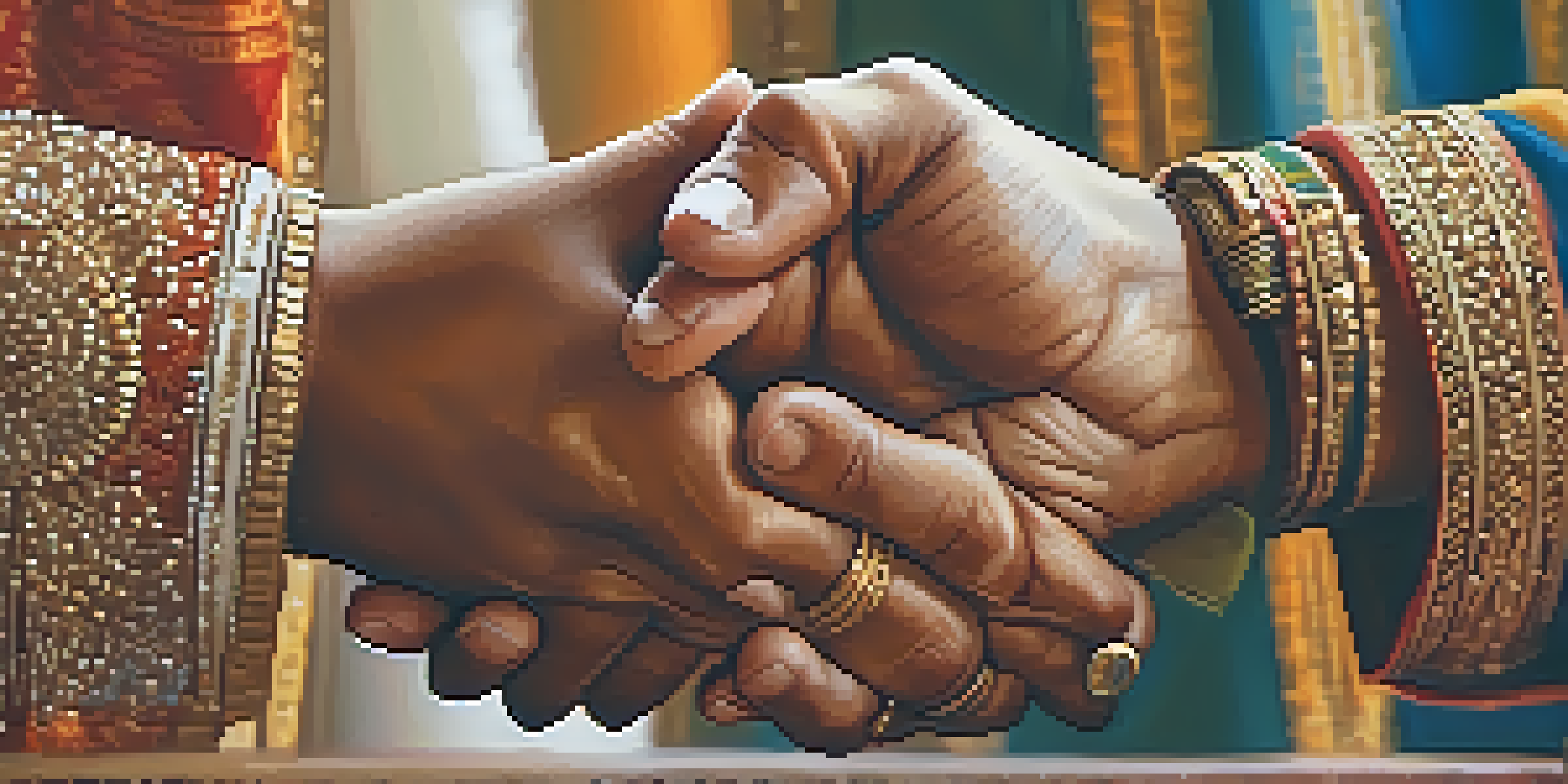Business Etiquette in India: Dos and Don'ts for Foreigners

Understanding the Importance of Greetings in India
In India, greetings are more than just a formality; they set the tone for the entire interaction. A simple 'Namaste', with hands pressed together, conveys respect and warmth. This traditional greeting is preferred in many business settings, so don't hesitate to use it.
The way we communicate with others and with ourselves ultimately determines the quality of our lives.
When meeting someone for the first time, it's common to shake hands, but be mindful that this might not be the case with everyone. Some may prefer a nod or a slight bow instead. Observing how others greet can provide valuable cues.
Remember, a warm smile and maintaining eye contact can go a long way in establishing rapport. This small gesture signifies your interest and respect for the other person, making your introduction memorable.
The Significance of Titles and Formal Address
In Indian business culture, addressing someone by their title is a sign of respect. Whether it’s 'Mr.', 'Ms.', or 'Dr.', using appropriate titles acknowledges the person's status and achievements. This practice is especially important in formal settings.

If you're unsure of someone's title, it's perfectly acceptable to ask politely. This shows your willingness to engage and respect their position. Plus, it avoids any potential embarrassment later on.
Greetings Set the Tone
In India, greetings like 'Namaste' reflect respect and warmth, playing a crucial role in initiating interactions.
As relationships develop, you may be invited to use first names, but tread carefully. It's best to wait until the person offers this familiarity, as it demonstrates mutual respect and understanding.
Punctuality: A Cultural Nuance
In many Western cultures, punctuality is paramount, but in India, time can be a bit more fluid. While being on time is appreciated, meetings may not always start as scheduled. It's useful to approach this with a flexible mindset.
Patience is not simply the ability to wait - it's how we behave while we're waiting.
However, this doesn't mean you should disregard punctuality entirely. Arriving on time is still a sign of respect, especially for formal meetings. It’s a good practice to reach at least five to ten minutes early to show your commitment.
If you're running late due to unforeseen circumstances, a quick phone call or message to inform your counterpart is courteous. This shows you value their time and helps maintain a positive impression.
Gift Giving: A Thoughtful Gesture
Gift giving can be an integral part of Indian business culture, often symbolizing goodwill and respect. However, it’s essential to be mindful of appropriateness. Simple gestures, like sweets or a small token from your home country, can be well-received.
Avoid extravagant gifts, as they may make the recipient uncomfortable or be misconstrued. It's the thought that counts, and a modest gift paired with a warm smile can speak volumes.
Respect Titles in Business
Addressing individuals by their appropriate titles in Indian business culture shows respect and acknowledges their status.
Also, be aware of religious and cultural sensitivities when choosing a gift. For instance, avoid items made from leather, as they may be inappropriate for certain individuals. A little research can go a long way in ensuring your gift is appreciated.
Dining Etiquette: Navigating Business Meals
Business meals in India can be quite elaborate and are often seen as an extension of the meeting itself. It’s customary for the host to take the lead, so allow them to guide the seating arrangements and menu choices.
If you're invited to someone’s home, it's polite to bring a small gift, such as sweets or flowers, as a token of appreciation. This gesture fosters goodwill and shows your consideration for their hospitality.
During the meal, wait for the host to start before you begin eating. If you're dining at a restaurant, be mindful of sharing dishes, as communal dining is common. However, it’s important to respect individual preferences, especially when it comes to dietary restrictions.
Body Language: Understanding Non-Verbal Cues
Body language plays a crucial role in Indian communication, often conveying more than words alone. A nod of the head, for instance, can imply agreement, understanding, or even a polite acknowledgment. Observing these cues can enhance your interactions.
Maintaining a comfortable distance while conversing is important; too much closeness may be perceived as intrusive. Conversely, stepping back too far can signal disinterest. Finding that sweet spot can help you establish a connection.
Embrace Patience and Flexibility
Patience is vital in Indian business, as decision-making can take time, and flexibility fosters positive relationships.
Also, be cautious with gestures. While a thumbs-up is generally positive, other gestures may have different meanings in India. Taking the time to learn these nuances can prevent misunderstandings and foster better relationships.
Patience and Flexibility: Key to Business Success
In the fast-paced world of business, patience is often overlooked. In India, decision-making processes can take time, and it's essential to remain adaptable. This flexibility not only enhances your reputation but also reinforces positive relationships.
Understanding that negotiations may involve back-and-forth discussions can help set realistic expectations. Embrace the process, as it often leads to a mutually beneficial outcome.

By approaching situations with an open mind, you're more likely to navigate challenges gracefully. This attitude can transform potential frustrations into opportunities for collaboration.